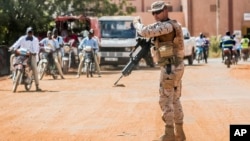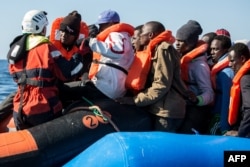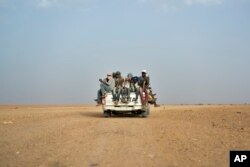The bombing of a barracks housing 250 Spanish soldiers in Mali was narrowly averted last week when vans containing about a ton of explosives were stopped short of the gates by guards firing machine guns.
“If the truck bomb had gone off inside the compound, it would have been a catastrophe,” said the commander of the Spanish light infantry battalion, Lt. Col. Jose Leyra.
The incident highlights how Spain's increasing role in European efforts to stabilize the Sahel — a primary route for African migrants attempting to reach Europe — is exposing its personnel and assets to attacks by Islamist militants and tribally based insurgents.
The Spanish unit is one of many conducting EU security missions in Sahel countries used as travel routes by African migrants from war-torn areas such as Somalia and Burkina Faso, where a Spanish priest working on relief programs was assassinated last week.
EU analysts say that further deterioration of the security situation in the Sahel, which is Africa’s poorest region, could increase illegal migration to Europe and destabilize wealthier countries in western and northern Africa.
On Friday, Spanish Foreign Minister Josep Borrel announced plans for EU investment in Africa, which he said presents “more opportunities than risks." But an EU threat assessment seen by VOA says that criminal and militant groups could undermine development projects in the sparsely populated Saharan countries that were once Spanish and French colonies.
“Crisis and conflicts in Africa are provoking mass migration that could seriously affect Spain, which is the EU country closest to Africa,” said Raimundo Robredo, a senior official in Spain's Foreign Ministry's Africa desk. Strengthening the capacity of local governments to manage the migrant flow and control vast territorial frontiers is a priority for Spain and other southern European nations, he said.
Italy's closure of ports to ships carrying migrants from Libya has shifted migrant routes westward to Spain, where illegal immigration has grown 170 percent over the past year. Spain is easily reached by small boats launched from the coasts of Morocco and Algeria.
To reach the coasts, however, migrants must travel through thousands of miles of desert, through Algeria, Mali and Mauritania.
A Spanish Civil Guard general, Francisco Espinosa, heads a $45 million EU project to train company-sized Rapid Intervention Surveillance and Investigation Groups (GARSI) in Mali, Mauritania, Niger, Chad, Burkina Faso and Senegal.
Their mission is to bolster frontier controls and target human trafficking, organized crime and terrorist networks that currently control parts of the region.
Select African recruits learn precision shooting and methods of locating and disposing of IEDs, as well as communications and mobility techniques, according to officials managing the program at its center in Madrid.
“Until now, frontier controls in the Sahel were largely limited to static border posts. GARSI is trained to improvise zone controls as migrant routes shift around,” according to a senior officer of the Civil Guard, who requested his name not be used.
GARSI information systems are enhanced with satellite links, and the teams are also trained in investigative methods to identify and break up human trafficking crime gangs, according to a Spanish officer who has coordinated support for the program with other European security services.
Italy’s Carabinieri, Portugal’s Republican Guard and France’s National Gendarmerie are also mentoring GARSI teams. Special operations units such as the French GIGN have been deployed on the ground, according to EU official reports that point to an expanding European security presence throughout the Sahel.
Spanish security officials say that “effective cooperation” is going on with security services in Senegal and Mauritania, which have made progress in controlling migration. But the situation shows signs of deteriorating in other countries, according to EU reports.
Leyra said in an interview for El Pais newspaper that there are “grave structural problems” in the way, including the presence of al-Qaida and interethnic conflicts, which make it “enormously costly to make the slightest progress."
Massive anti-government protests that broke out in Algeria last week may create yet another source of instability.







